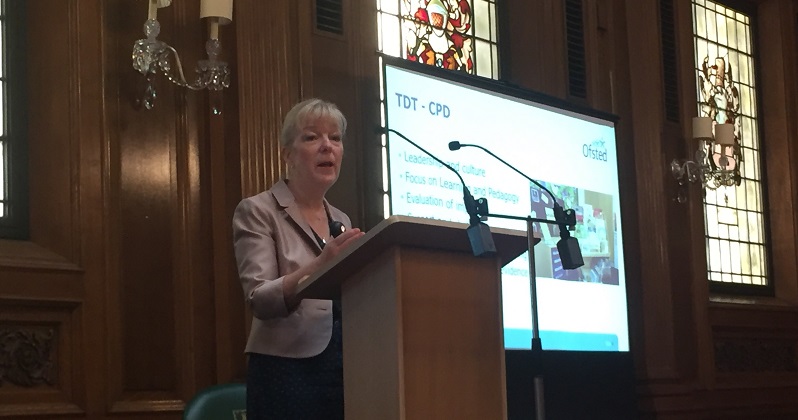Ofsted’s next inspection framework will promote a more “collaborative” approach to leadership, in a move away from the “male-dominated” culture of the watchdog’s past, a senior inspector has said.
According to Gill Jones, Ofsted’s deputy director for early education, Amanda Spielman has sought to steer the organisation’s approach to rating school leadership away from the legacy of her predecessor Sir Michael Wilshaw since her appointment as chief inspection last January.
The leader does not necessarily have to be the knight on the charging horse going forth
The watchdog already puts less of an emphasis on getting rid of headteachers when schools are struggling, Jones said, and further changes will be reflected in Ofsted’s next inspection framework, which will come into effect next September.
Speaking at the Teacher Development Trust’s career progression summit today, Jones said Ofsted has in the past had “a fairly male-dominated leadership group”, and that its current inspection framework is “very leadership focused”.
“Sir Michael Wilshaw’s view was very clear that the headteacher sets the tone, the headteacher drives the culture within the school,” Jones told delegates.
“Amanda’s view is very much that leadership is a joint thing, the leader does not necessarily have to be the knight on the charging horse going forth – hers is a much more a consultative style of leadership.”
Jones described Ofsted as being “a bit like the titanic”, in that “when it’s set on its course, it’s set on its course and we have to continue on that course until the end of a framework.”

But since her appointment last year, Spielman has worked to change Ofsted’s culture. For example, the watchdog is already less hasty in the way it deals with headteachers of struggling schools.
“In Ofsted we’ve been guilty of actually supporting the system that if someone isn’t doing well enough then they have to go,” Jones said.
“Five years ago we were congratulating governing bodies, leaders, if a school that was in difficulty, that the head went, that was step number one. We’re a far more reflective organisation now.”
The system must focus more on what has to be improved rather that just changing the person in charge, she argued.
“If something’s not right it must be the system’s job, and people within that system, to get it better, and getting something better isn’t necessarily by chopping off the head.”
She also challenged the watchdog’s approach to pupil progress data, and suggested that it currently carries too much weight in the way inspectors make school judgments.
But Spielman’s interest in “evidence-based inspection” is moving Ofsted “into a new place”.
“Schools spend a long of time producing lots and lots of progress data for us to look to judge whether children are making sufficient progress, and if we judge that they do then the cards stack up to say well everything else must be okay then.
“Progress data holds an importance that may not be quite right. It’s a driver in the system that currently, we at Ofsted need to look at really closely.”
Last year, a survey of Ofsted staff found that approval of the watchdog’s leadership has soared since Spielman took over.







There is a real smell of the new football manager here. Suggest the team is not fit enough, aka leadership is not collaborative enough and you add credibility to your own position. Leadership is complex. Yes successful organisations need more collaborative leadership, but this is hard nosed. It gives responsibility to great people as part of a sophisticated approach to continuous improvement. When an organisation is failing it is nearly always because of a failure of leadership, this is true in every sector. Sometimes failing organisations need authoritarian leadership to stop the decline and reverse it, great leadership changes its approach according to situation and context. Surely a school must be judged on how it’s pupils are doing!
When a schools is doing badly it is usually obvious and clear WHAT has to be improved, to focus on this ( according to the article ) is the way forward. Sorry but WHO and HOW moves organisations forward. This really smacks of a new leader courting approval from the establishment rather than focussing on root causes. I am totally unconvinced by Gill Jones analysis.
The Ofsted framework changes as often as a TV presenters clothes. This leads to massive difficulties for schools that are trying to improve. There are too many civil servants changing their role too often, when they change they all have to do something and change something. This is at the heart of the problem in State Education. Surely the leadership of Ofsted should have some experience of schools. She will probably be gone within less than five years and more change will follow. What makes a good school is simple to identify but in many circumstances incredibly complex and difficult to achieve. I have no confidence in the current leadership of Ofsted, I really hope I am totally wrong!
As an outside observer this shows a problem we have in general in society, but one that is endemic in the education sector.
1. Everyone complains about Ofsted and how it’s not fit for purpose.
2. Change is announced to try and improve things.
3. Everyone complains that things change too much.